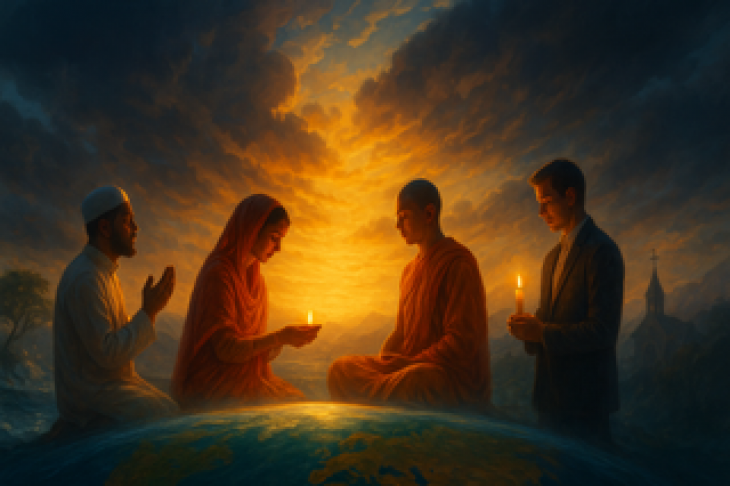
By Publisher Ray Carmen
When the earth quakes, when the sea surges, when the sky unleashes its fury , humanity pauses. In every age and every culture, natural disasters have raised a timeless question: Why do such things happen? From the temples of Asia to the chapels of the Caribbean, faiths have sought to explain nature’s wrath not as mere catastrophe, but as a mirror reflecting deeper truths about life, divinity, and the human spirit.
Islam: A Test and a Reminder of Faith
In Islam, the forces of nature are not accidents of chance but expressions of divine will. Earthquakes, floods, or storms are seen as ayat , signs from Allah, calling humanity to reflection. The Qur’an speaks of such events as tests of endurance and faith. For Muslims, calamity can be both a warning and a mercy , an opportunity to return to righteousness and to practice compassion (rahma) for those afflicted.
Charity, community support, and prayer are central responses, transforming suffering into solidarity. As many imams remind the faithful, even in destruction there is remembrance: “With hardship comes ease.”
Hinduism: The Cosmic Dance of Karma and Renewal
In Hinduism, nature’s fury is part of an eternal cycle of creation, preservation, and dissolution ,the great rhythm of the cosmos. Disasters are not punishments but expressions of divine balance, woven into the law of karma that governs all existence.
Through this lens, earthquakes, floods, and droughts reflect the natural ebb and flow of universal energy. Deities like Shiva, the cosmic dancer, embody both destruction and rebirth , showing that endings are also beginnings.
Hindu traditions emphasize purification through ritual (puja) and service (seva). After disaster, communities gather to honor the elements , water, fire, air, and earth , seeking to restore harmony between humankind and the forces of nature.
Buddhism: Impermanence, Karma, and Compassion
Buddhism offers perhaps the most introspective lens on natural calamity. The Buddha taught that all phenomena , mountains, oceans, even civilizations , are impermanent (anicca). Disasters, then, are reminders of this universal truth: that attachment to the illusion of permanence leads to suffering (dukkha).
Rather than divine punishment, disasters are understood as natural consequences within the web of interdependent causes and effects (pratītyasamutpāda). Karma operates not as fatalism but as moral law , urging mindfulness in how we live, consume, and treat the world.
The Buddhist path encourages compassion (karuṇā) for all beings in times of crisis. Monks and lay followers alike engage in meditation, relief work, and rebuilding — transforming tragedy into an act of spiritual practice. To suffer is to awaken; to help others is to heal the world.
Christianity: Between Judgment and Compassion
In Christian thought, natural disasters have long been seen as part of the divine mystery , sometimes as trials of faith, sometimes as calls to repentance. Yet in the light of the Gospel, they also become opportunities for love in action.
Jesus’s teachings emphasize compassion over condemnation. When floods or fires strike, Christians are called to serve, to comfort, and to rebuild. The crucifixion and resurrection remind believers that suffering can yield redemption , that light is often born from the darkest storm
Churches across the Caribbean and beyond respond to disasters not only with prayer, but with food, shelter, and hope — embodying the belief that God’s grace flows most powerfully through human kindness.
A Shared Reflection: Nature’s Voice, Humanity’s Response
Though their languages differ, the world’s faiths echo a shared truth: that nature is sacred, and its upheavals are not senseless but meaningful. Whether seen as a divine test, a karmic rhythm, or a lesson in impermanence, disasters reveal humanity’s smallness , and our immense capacity for compassion.
In the Caribbean, where hurricanes, tremors, and floods shape the rhythm of life, this truth feels deeply familiar. Each faith offers its own path toward understanding, yet all converge on one point of wisdom: when the earth trembles, hearts must not harden, but open.
For in every storm lies a whisper , not of wrath, but of renewal.




